Interior Secretary Salazar imposed a moratorium on deepwater drilling until November 30, contrary to the recommendation of a panel of experts from the National Academy of Engineering. For operations on the shallow water Shelf, the administration maintains, no official moratorium is in place. After all, the Shelf still enjoys a forty-year history of relatively safe and clean operations that is still intact, being several orders of magnitude safer than the Deepwater Horizon-style deepwater oil exploration.
There’s no moratorium here, folks. Business as usual, nothing to see. Move along, move along.
But Interior has plenty of tricks up its sleeve to create a de facto shallow water moratorium. The new Bureau of Ocean Energy Management, Regulation and Enforcement or BOEMRE (pronounced “bummer”) is charged with issuing permits and setting operating standards for oil and gas companies in the Outer Continental Shelf. Oh, they’re still issuing permits, all right:
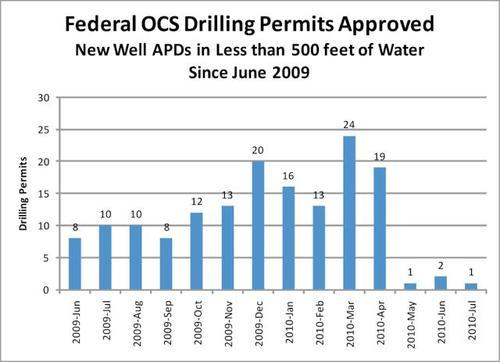
The above graph shows just the new drilling permits. The de facto moratorium has wasted offshore “prime time” – May, June and July – the good-weather period before the worst of hurricane season.
Permits for new seismic surveying and for pipeline installation have ground to a standstill, too. The last thing an operator wants to do is drill a successful well but not be able to sell the product, it’s possible that some permits applications are being held pending some resolution of the institutional chaos within BOEMRE.
The unilateral decision by the Administration to put the brakes on in the offshore create a precarious predicament for domestic development. Operators have a choice for where to spend their exploration budgets. They consider the geology, logistics, reserve potential and projected return on investment. A key consideration is “political risk”.
Up until now, the U.S. has always been the gold standard for political risk, compared to, say, a third world country with no institutional history, or a Venezuela, with history of expropriation of private assets. The U.S. has always had a high respect for private property rights and the rule of law.
Consider the operators’ position: having invested (collectively) billions of dollars in lease bonuses, seismic exploration, exploratory drilling and development, there is no certainty that the current political regime is a friendly one that will allow timely development.
To an operator or an investor, the difference between a defacto indefinite permit moratorium and an outright taking is a semantic one. Risk is risk, and capital hates risk.
Secretary Salazar has maintained that all an operator needs to do to secure a permit is to comply with the new rules. Easier said than done, Ken. Operators have encountered road blocks at every turn.
Under the new rules, all BOP equipment must be recertified. Since it must all be done at once before permits can be issued, the requirement has created a huge backlog in the few shops that are licensed to perform the certifications.
Projects like pipeline installation and routine pipeline installation used to be granted permits under a blanket environmental impact study (EIS) which effectively acknowledged the fact that none of these projects is really unique. Now they must be assessed for the need for individual EISs, and the agency has no standards upon which to make the assessment.
Drilling permits depend on a calculation of “Worst Case Discharge” which is a theoretical and speculative exercise based on unknowable parameters. Permit applicants are therefore engaging in debates with BOEMRE that are the engineering equivalent of arguing how many angels can dance on the head of a pin — there being no right answer, the issue can be (and is) debated ad infinitum.
The Deepwater Horizon incident gave the environmental community an excuse to open up a Fibber McGee’s closet of tangential and irrelevant issues that will be used to stymie development. On top of that, one operator was told directly by a BOEMRE employee that he could not offer the slightest measure of flexibility in considering their permit application, as his job would be on the line if it came to light. Fear and chaos in BOEMRE afford Obama and Salazar the best of both worlds, from the perspective of their green agenda: they get to enjoy a near-total hiatus in rig activity without the political mess resulting from yet another official moratorium.
They’d better watch out. Companies with budget flexibility just might John Galt this bee-yotch. Since the U.S. still gets two-thirds of its energy from oil and gas, and will for the foreseeable future, yeah, it matters.
Cross-posted at RedState.com.




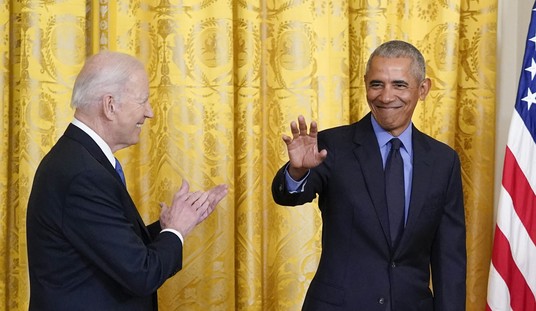

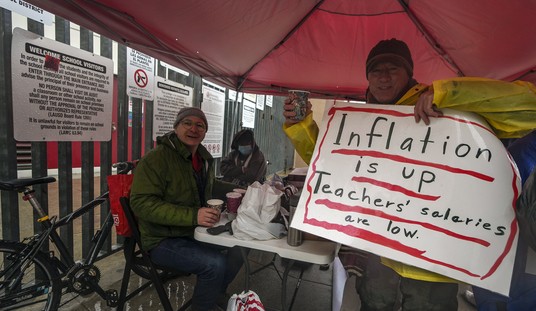


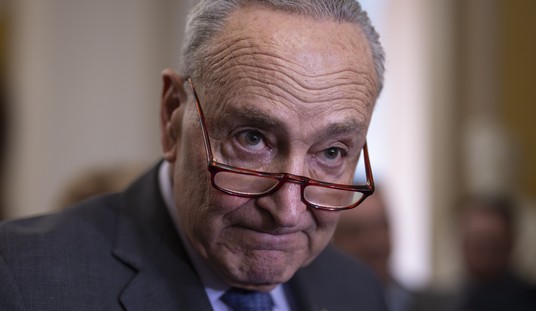


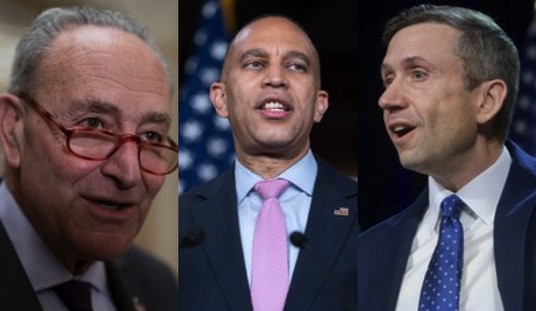
Join the conversation as a VIP Member